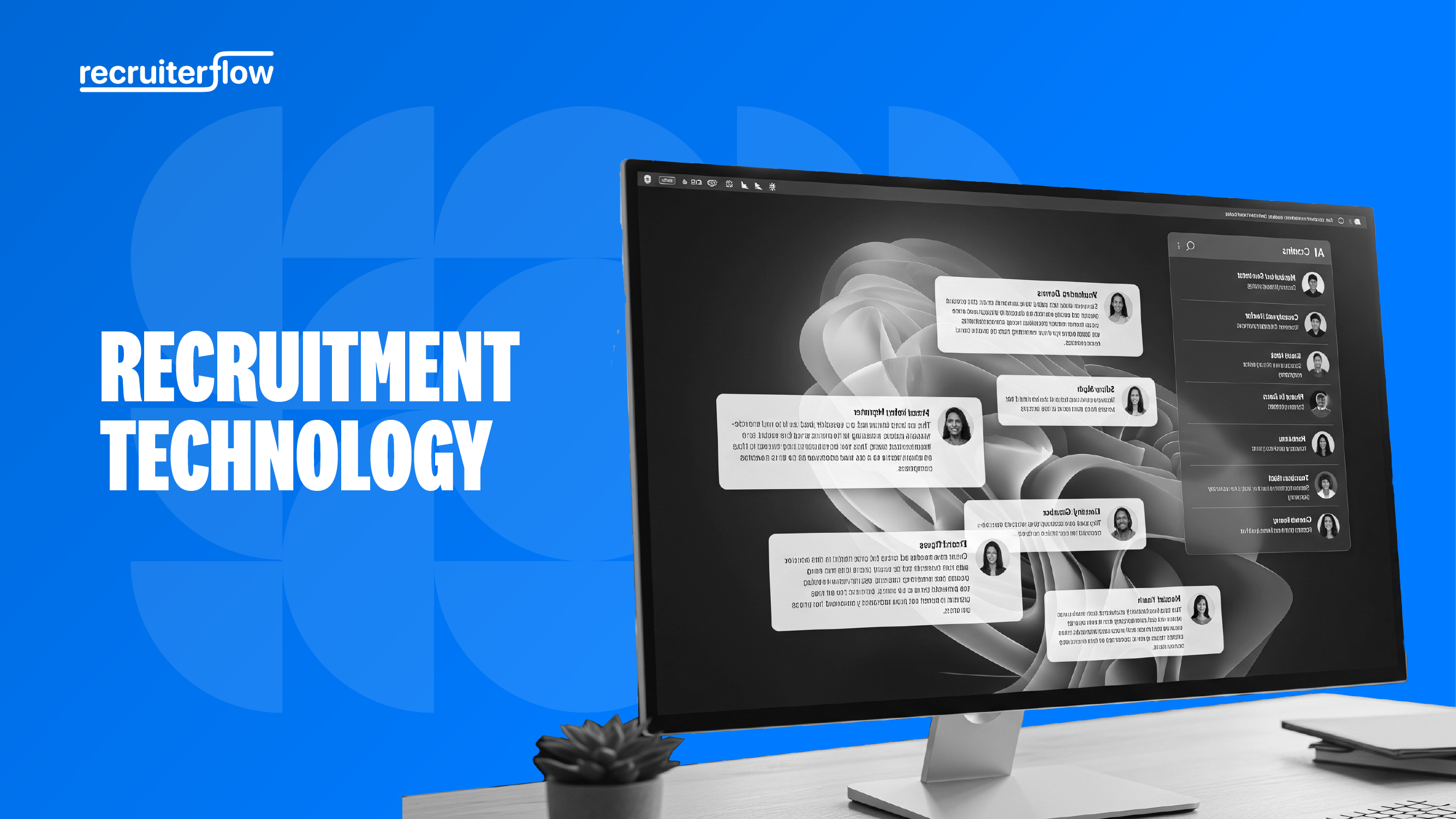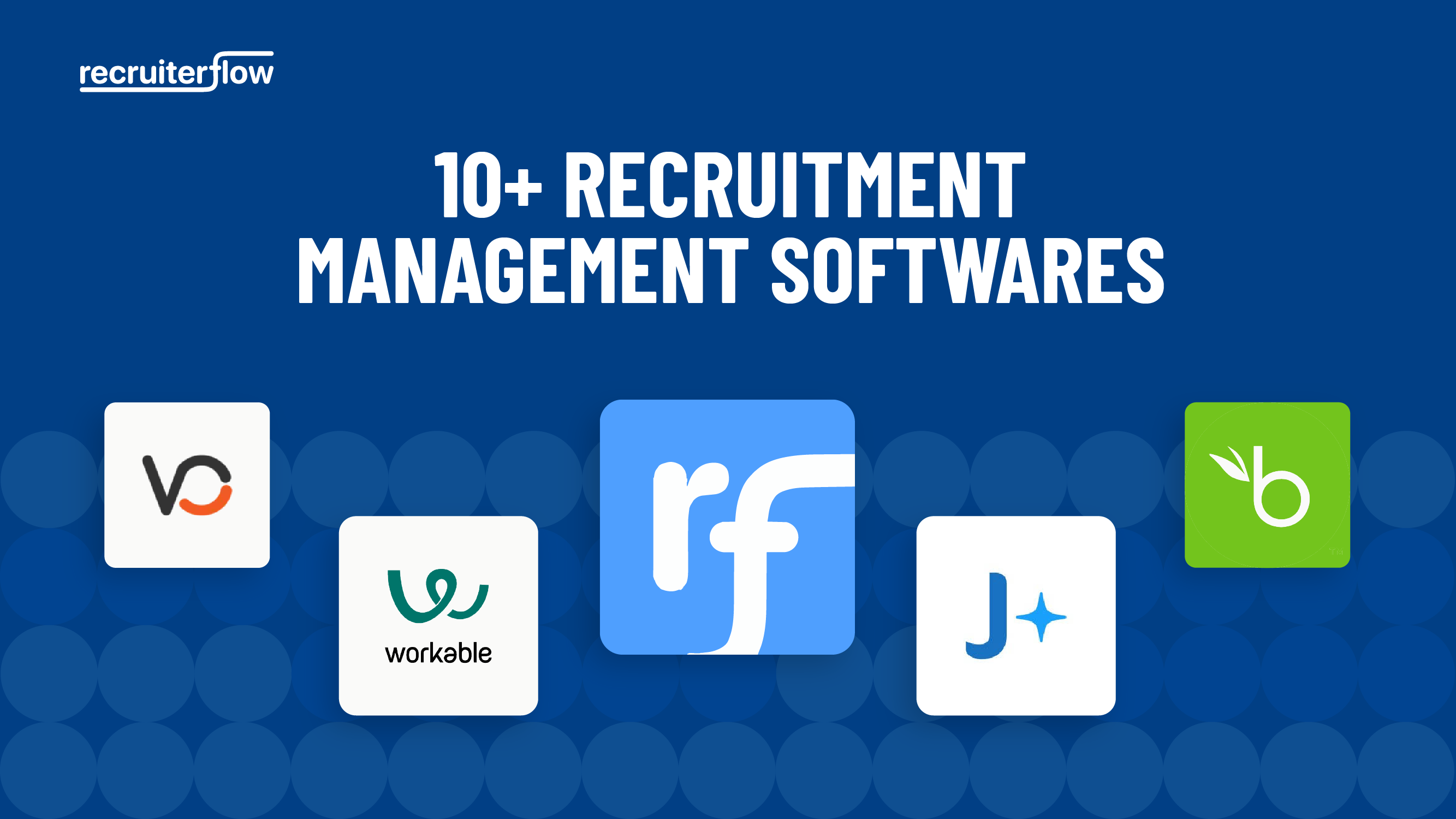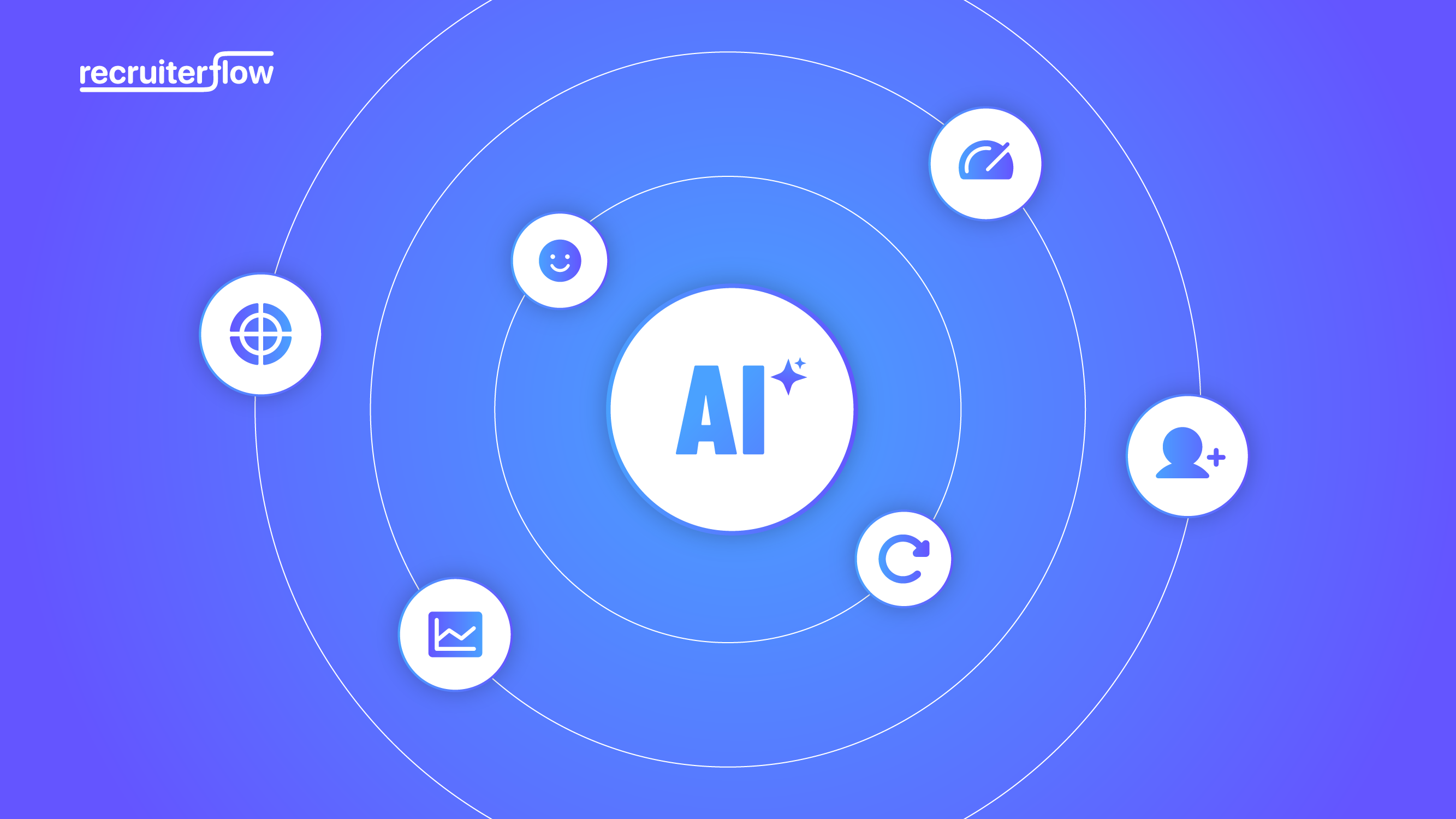
Recruitment Technology: A Complete Guide for 2026

If you thought 2025 was a game changer in the fast-paced world of agency recruiting, 2026 is set to push the envelope even further, and it all starts with the right recruitment technology.
As an agency recruiter, you know the grind. The constant search for the perfect candidate, the endless communication, the tight deadlines. Recruitment technology solutions give you the power to make your work more effective, to take the time you need to focus on strategy and client development, and to deliver better, more consistent outcomes for your clients time after time.
Our comprehensive guide will help you understand the recruitment tech landscape, key trends, top tools, and how to choose the right tech to power your recruitment agency in 2026 and beyond.
In this guide, we will understand what recruitment technology is, its importance, key technologies like AI, automations, and how you can choose the right recruitment technology for your agency.
What is Recruitment Technology?
Recruitment technology comprises the digital tools, platforms, and software applications built to help employers and recruitment agencies improve and automate the hiring process.
Recruitment technology tools encompass every stage of the recruitment life cycle, from attracting and sourcing candidates to interviewing, onboarding, and analytics.
Typical recruitment technology features and tools include:
- Candidate Screening Tools helps recruiters automate resume and application review.
- Applicant Tracking Systems (ATS) help to store and manage candidate data, track applicants throughout recruitment stages, and are more organized.
- AI-Powered Recruiting Tools use machine learning and natural language processing to automate tasks such as resume parsing and candidate matching, and AI-powered chatbots for communication.
- Video Interviewing Platforms help to schedule and conduct video interviews remotely.
- Candidate Relationship Management (CRM) Systems enable recruiters to build and manage candidate relationships, engage candidates with personalized and timely communication, and track candidate data and pipeline.
- Data Analytics and Reporting Platforms help to understand recruitment metrics, optimize strategies, and drive efficiency.
Why Recruitment Technology is Important in 2026
The recruitment landscape in 2026 is more competitive and complex than ever. Here’s why recruitment technology is indispensable for agency recruiters:
Efficiency and Cost Reduction
Automation reduces the manual effort required in repetitive tasks such as resume screening, email outreach, interview scheduling, reference checks, and more. This frees recruiters up to focus on higher-value activities like building client relationships and strategic advising.
Also read: How a Recruiting Agency Increased Job Orders by 142% with Advanced Automation
Data-Driven Decision-Making
Advanced data analytics and talent intelligence tools give recruiters deep insight into candidate fit, hiring data, market trends, etc., and help inform critical decisions and drive smarter hiring.
Candidate Experience
Candidate experience is now one of the key differentiators in the hiring process. Recruitment technology helps to provide a more personalized and engaging experience for candidates at every touchpoint, from AI chatbots that can answer candidate questions and set expectations 24/7 to tools like video interviews, candidate engagement emails, text messaging, and candidate portals.
Remote and Global Hiring
The pandemic put remote work into the mainstream, and there’s no going back. Hiring teams need to source, assess, and onboard talent from anywhere in the world.
Agencies need to be just as agile. Recruitment technology is the key to breaking down geographic barriers and delivering a seamless candidate and client experience in the global economy.
The 2024 Global Workforce Report from Remote.com found that 87% of employers have filled at least “4 out of 10” roles with international candidates, and 71% of all teams are actively recruiting from outside their home country.
Also, check out our blog to explore the key benefits of using AI in recruitment.
Key Recruiting Technology Trends
Staying ahead in 2026 means understanding the trends driving recruitment technology. Here are the most significant shifts agency recruiters need to watch:
1. Artificial Intelligence and Machine Learning
AI and ML have gone from recruiting hype to a business essential. Tools that use machine learning and natural language processing automate resume screening and candidate matching.
AI can also improve candidate sourcing, while tools like AI chatbots can answer candidate queries and set expectations 24/7. AI-driven interview tools can track and analyze candidate interactions, which helps optimize the process to be fairer and more consistent.
2. Automation and Workflow Optimization
Automation is automating every step of the recruiting process, from interview scheduling to reference checks and keeping hiring moving forward. Automated workflows can reduce manual effort, cut down on errors, and significantly speed up the hiring process and the volume agencies can service.
3. Virtual and Augmented Reality Assessments
Augmented reality is moving into the hiring process in the form of virtual reality assessments. From video interviews to real work simulations using virtual reality headsets, the future of recruitment is using tech to offer more of a true representation of candidate skills and company culture, particularly for remote and technical roles.
4. Interview Intelligence and Optimization
Interview intelligence solutions use AI to analyze candidate interview interactions and provide real-time feedback to interviewers and help optimize the interview process to be fairer and more data-driven. In 2026, these solutions can help agencies deliver a better candidate experience and better hiring decisions.
5. Skills-Based and Gamified Assessments
Skills-based hiring is now a leading trend in recruitment, and using recruitment technology tools such as gamified assessments and coding challenges to accurately and objectively test candidate skills is a leading trend among agencies looking to reduce bias and ensure that candidates are assessed fairly on their actual abilities, not their resumes.
6. Advanced Analytics and Talent Intelligence
Recruitment analytics and talent intelligence solutions are the secret weapons for agencies that want to give their clients a strategic advantage. These solutions help to build deeper and more comprehensive insights into their available talent pool, competitive activity, as well as offer predictive and prescriptive insights into regional availability and pipeline planning.
7. Integrated ATS and CRM
Recruitment platforms with both an ATS and CRM are quickly evolving into a single place for all candidate and client interactions, from phone calls to interviews, assessments, and notes.
This unifies candidate data and enables highly personalized and timely candidate engagement at scale while ensuring no promising candidate slips through the cracks.
8. Enhanced Candidate Experience Platforms
From AI chatbots and personalized email nurture campaigns to scheduling and video interviews, recruitment technology tools are making a big difference to how candidates experience the hiring process. Candidate experience tech enables personalization at scale, supercharged speed at every candidate touchpoint, and a frictionless experience that candidates love.
Also read: 9 Recruitment Trends that are Shaping 2026
Top Recruitment Technology Tools and Platforms
With hundreds of solutions on the market, choosing the right tools can be overwhelming. Here’s a look at some of the top recruitment technology platforms agency recruiters are using in 2026:
| Tool/Platform | Key Features | Best For |
| Recruiterflow | Integrated ATS + CRM, advanced automation, AI Agentic workflows, email sequences | Recruiting agencies seeking an all-in-one, AI-driven recruitment stack |
| hireEZ | AI-powered sourcing, engagement, analytics, DEI filters | High-volume sourcing, diversity hiring |
| Greenhouse | ATS, structured interviewing, onboarding, analytics | Agencies needing robust workflow management |
| Lever | ATS + CRM, automation, reporting, candidate nurturing | Agencies focused on candidate experience |
| Workable | ATS, sourcing, video interviews, AI screening | Small to mid-sized agencies |
| Breezy HR | Visual pipelines, automation, video interviews, reporting | Agencies wanting intuitive, user-friendly tools |
| SeekOut | AI sourcing, diversity analytics, talent mapping | Agencies building diverse talent pipelines |
| Harver | Pre-employment assessments, gamified skills testing | Agencies prioritizing skills-based hiring |
| Spark Hire | One-way and live video interviewing, interview analytics | Agencies with remote/interview-heavy workflows |
| Codility/HackerRank | Technical assessments, coding challenges, analytics | Tech recruiters, skills-based hiring |
While some of the above platforms offer varying degrees of automation, analytics, and integrations, most have been built with agency workflows in mind. Platforms like Recruiterflow are built specifically for agencies, combining ATS, CRM, and AI-powered sourcing in one unified platform.
Choosing the Right Recruitment Technology for Your Agency
Selecting the right AI recruiting technology is a strategic decision that can make or break your agency’s success. Here’s a step-by-step approach to ensure you pick tools that fit your needs:
1. Assess Your Agency’s Needs
- What is your agency’s size, sector focus, and hiring volume?
- Do you need an all-in-one solution or a best-of-breed approach to tools covering specific stages of the recruiting process?
- What are the biggest problems that you need to solve? Sourcing, screening, client reporting, candidate engagement, workflow, etc.
2. Prioritize Must-Have Features
- ATS and CRM integration for seamless workflow
- AI-powered sourcing and candidate matching
- Automations for repetitive tasks like interview scheduling, follow-up emails, etc.
- Analytics and reporting dashboards
3. Scalability and Integration
- Does the platform have the ability to scale with your agency?
- Does the platform integrate with your existing tools and software (email, calendar, job boards, assessment platforms, etc. )?
4. Evaluate User Experience and Support
- Is the platform easy for your team to use?
- Is training and support available from the vendor?
- Mobile apps for hiring on the go?
5. Analyze ROI and Pricing
- Cost of ownership (subscription, setup, training, etc. )?
- Value and speed of return (time saved, higher placements, efficiencies, etc. )?
6. Request Demos and Trials
- Involve recruiters in testing platforms to shortlist.
- Ask for case studies or references from other agencies similar to yours.
7. Focus on Data Security and Compliance
- GDPR and other data privacy compliance are essential.
- Does the platform have secure data handling, candidate consent management, etc.?
Recruitment Technology FAQs
1. How can recruitment technology help agencies scale?
Recruitment technology solutions help to automate time-consuming and repetitive tasks (resume-screening, scheduling, follow-up emails), centralize data for candidate management, and enable recruiters to handle significantly more volume without sacrificing quality. AI-powered sourcing tools help recruiters to find passive candidates faster, while analytics platforms offer recruiters and hiring managers more data to optimize their process and drive more placements.
2. What is the best AI tool for recruitment agencies?
Platforms such as Recruiterflow have been getting consistently high reviews for their AI-powered sourcing, candidate matching, automation, and user experience. The best solution for your agency will depend on your agency’s unique needs and hiring volume.
3. Can recruitment technology improve candidate matching?
Yes. AI and machine learning technology use algorithms to analyze resumes, job descriptions, and past hiring data to recommend candidates that are more likely to be successful in particular roles. This significantly improves the quality and speed of candidate matching, reducing risk and bad hires.
4. What is the ROI of recruitment technology for agencies?
Agencies that leverage recruitment technology report savings in hiring costs of up to 60% and faster time-to-fill of up to 70%. This ROI comes from time savings, efficiency gains, higher placement rates, higher quality candidate experience, and allowing agencies to scale faster without increasing headcount.
5. How does AI affect agency recruiter productivity?
AI will take over more and more time-consuming and administrative tasks such as resume screening, candidate matching, and initial outreach to candidates. This leaves recruiters with more time to focus on other important tasks, such as client relationship-building and offer-closing, and faster results, which leads to more productivity, more placements, and ultimately, happier clients.
6. What recruitment systems are most effective for staffing firms?
Staffing firms benefit from using ATS + CRM platforms (Recruiterflow, Bullhorn, Lever) that give them integrated tools for full-service recruitment alongside AI-powered sourcing software (hireEZ, SeekOut) and assessment tools and platforms (Harver, Codility).
Conclusion
Recruitment technology is the foundation of modern agency success. In 2026, the agencies that win will be those that harness the power of AI-powered recruiting and integrated platforms like Recruiterflow to deliver smarter, more human-centric hiring experiences.
Recruitment technology is the key to agency growth in 2026, and nothing proves it better than real results. Guy Last Recruitment, a specialist RPO agency, switched to Recruiterflow and saw a 142% increase in job orders and a 41% boost in recruiter productivity.
With Recruiterflow’s automation and client portal, they delivered more value to clients, sourced more candidates, and scaled their business faster than ever.
Ready to see what Recruiterflow can do for your agency? Book a demo today
Recruitment


Pragadeesh Natarajan